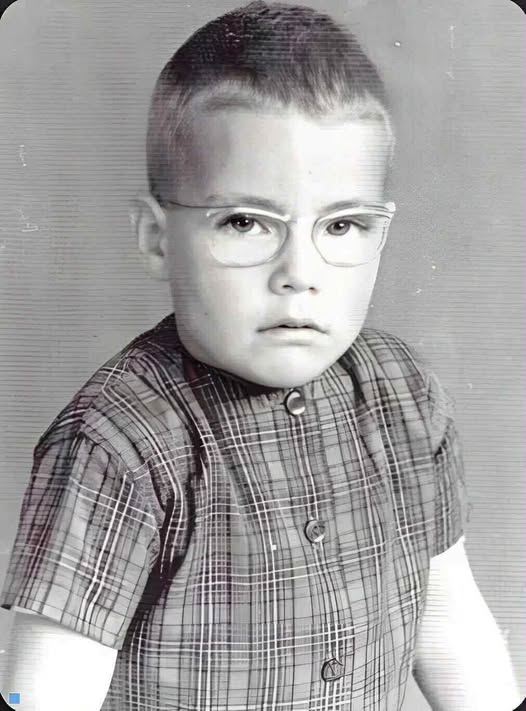Before Jean-Claude Van Damme became a household name worldwide, known for his explosive martial arts skills and iconic action roles, he was a shy boy with glasses and a quiet, almost introverted personality. Growing up in Belgium, he wasn’t the type of kid who thrived on attention or loud chaos; instead, he was often seen as fragile, a little different from the other children. There are stories of him being bullied for appearing physically weak or for his slightly awkward mannerisms—something that could have left him feeling small and powerless. But what many don’t realize is that behind that shy boy’s exterior was a fierce desire to find strength and purpose.
His journey from that shy, glasses-wearing kid to a global action star is nothing short of remarkable. It was a path paved with perseverance, passion, and a determination to redefine himself. One of the first things that set him apart was his deep love for ballet. Yes, ballet. While it may seem surprising given his later career in tough fight scenes, ballet taught him lessons that would become the foundation of his fighting style and his life philosophy. For five years, Van Damme devoted himself to ballet training, immersing himself in the discipline, grace, and rhythm that the art demands. He learned to move with precision, control, and a sense of timing—traits that would serve him well both on the stage and in the ring.
During those ballet years, Van Damme also developed a love for Beethoven, particularly his symphonies, which seemed to resonate with his early sense of elegance and control. Beethoven’s music, with its soaring melodies and dramatic shifts, became a guiding soundtrack for his inner journey, teaching him about patience, perseverance, and the importance of harmony between strength and finesse. There’s a certain poetry to that—how a boy who was once considered physically fragile found resilience through the art of dance and classical music, both of which require relentless dedication and passion.
As he approached his teenage years, Van Damme decided to take an active step toward building confidence—he began practicing karate at age 10. Initially, it was about self-defense, but it quickly became much more. Karate gave him a structure, a way to transform his vulnerability into power. With every punch and kick, he felt himself getting stronger, more self-assured. But even as his skills grew, he didn’t abandon the grace he had learned from ballet. Instead, he combined the two worlds, blending the fluidity of ballet with the explosive power of martial arts.
In fact, Van Damme’s unique style—often described as “fitness with elegance”—began to catch the attention of trainers and competitors alike. He didn’t just rely on brute strength; he mastered a dance-like flow that made his fight scenes look almost musical. At a young age, he became a karate champion in Belgium, a testament to his dedication and natural talent. That victory was a milestone—a sign that his hard work was paying off and that he could stand tall among the fighters of his generation.
But the real game-changer happened when Van Damme moved to Hollywood. He entered a new world filled with big dreams, even bigger egos, and fierce competition. Those same disciplines that made him a champion in Belgium—his grace, discipline, and unique fighting style—set him apart in the brutal world of action movies. His fight scenes stood out because they weren’t just about violence; they were a seamless fusion of style, rhythm, and power, almost like watching a carefully choreographed dance. His signature moves—like the iconic split during his fight in “Bloodsport”—became legendary and helped him carve a niche in Hollywood’s action hallmark.
What makes Jean-Claude Van Damme’s story so inspiring is that it’s not just about physical strength. It’s about overcoming doubts, bullying, and the feeling of being small in a world that often values toughness over tenderness. His passion for ballet and classical music might seem like soft pursuits for an action hero, but for Van Damme, they were the keys to unlocking his true potential. They gave him a sense of purpose, balance, and rhythm—elements that helped define his fighting style and his outlook on life.
Looking back, it’s clear that Van Damme’s rise from a fragile child to a martial arts icon wasn’t just luck or timing. It was the power of passion and perseverance, and a willingness to embrace every part of himself—even the parts that others might have dismissed. His journey shows that strength isn’t just about muscle; it’s about discipline, resilience, and the courage to stay true to your dreams no matter the obstacles.
Today, when fans see him perform those spectacular kickboxing scenes or remember his heartfelt interviews, they’re witnessing the testament of a man who believed in transforming vulnerability into victory. His story continues to inspire countless people around the world, proving that no matter how shy or weak you might feel at first, passion and relentless effort can turn anyone into a champion—on the stage, in the ring, and in life.




